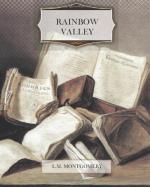Walter Blythe was sitting under the White Lady, with a volume of poems lying beside him, but he was not reading. He was gazing now at the emerald-misted willows by the pond, and now at a flock of clouds, like little silver sheep, herded by the wind, that were drifting over Rainbow Valley, with rapture in his wide splendid eyes. Walter’s eyes were very wonderful. All the joy and sorrow and laughter and loyalty and aspiration of many generations lying under the sod looked out of their dark gray depths.
Walter was a “hop out of kin,” as far as looks went. He did not resemble any known relative. He was quite the handsomest of the Ingleside children, with straight black hair and finely modelled features. But he had all his mother’s vivid imagination and passionate love of beauty. Frost of winter, invitation of spring, dream of summer and glamour of autumn, all meant much to Walter.
In school, where Jem was a chieftain, Walter was not thought highly of. He was supposed to be “girly” and milk-soppish, because he never fought and seldom joined in the school sports, preferring to herd by himself in out of the way corners and read books—especially “po’try books.” Walter loved the poets and pored over their pages from the time he could first read. Their music was woven into his growing soul—the music of the immortals. Walter cherished the ambition to be a poet himself some day. The thing could be done. A certain Uncle Paul—so called out of courtesy—who lived now in that mysterious realm called “the States,” was Walter’s model. Uncle Paul had once been a little school boy in Avonlea and now his poetry was read everywhere. But the Glen schoolboys did not know of Walter’s dreams and would not have been greatly impressed if they had. In spite of his lack of physical prowess, however, he commanded a certain unwilling respect because of his power of “talking book talk.” Nobody in Glen St. Mary school could talk like him. He “sounded like a preacher,” one boy said; and for this reason he was generally left alone and not persecuted, as most boys were who were suspected of disliking or fearing fisticuffs.
The ten year old Ingleside twins violated twin tradition by not looking in the least alike. Anne, who was always called Nan, was very pretty, with velvety nut-brown eyes and silky nut-brown hair. She was a very blithe and dainty little maiden—Blythe by name and blithe by nature, one of her teachers had said. Her complexion was quite faultless, much to her mother’s satisfaction.




